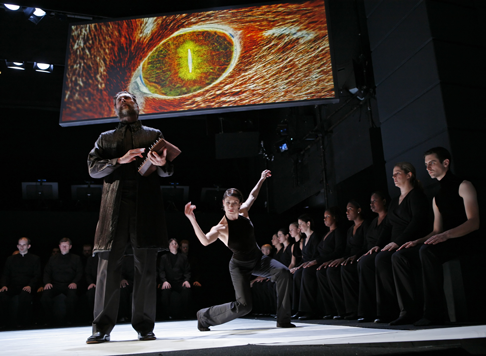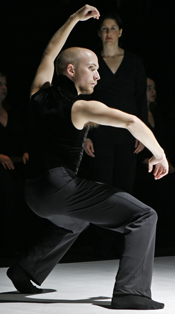Now
they are all grand old (mostly dead) men, and the public, which is as curious
about new sounds in concert music as in popular music, having heard such
sounds in the background of a hundred films, is no longer afraid of what they
do not immediately understand. They are no longer being told that they
should like it, or should ignore this or that from the
past; they are freer to select and explore. We live in an atmosphere where
the new no longer means just one sort of new (it never did, but it had that
reputation); we have come to expect the unexpected, and appreciate it when it
shows up.
Nowhere is this change in audience expectations and interest more
startling than among the opera audience. This is good news for opera
companies and for composers, though it may not be great news for traditional
singers (few modern composers have their specific training or methods of
expressivity in mind) and for the audience who loves the old-fashioned vocal
style.
These reflections came to me after a spring whose chief Met Opera delight
was Satyagraha, whose chief summer festival interest was
Zimmermann’s Die Soldaten, and an autumn opera season
commencing with Xenakis’s Oresteia. None of these are
traditional operas performed in a traditional manner. None of them could
easily fit into a typical opera house repertory season. And the audience,
immensely various in age and style and attitude, has been tremendously
enthusiastic for all three. Vocally they represent differing poles:
Satyagraha provided some of the loveliest traditional opera singing
of the year, showing that living composers can do this if they wish to,
though some may carp that this particular drama was hardly of a traditional
variety. (You could say the same about Parsifal, and Cosima Wagner
did, come to think of it.)
Xenakis – like his fellows other than Henze – would have been
reluctant to try to compose an opera of the traditional type, for performance
by any traditional company. His setting of Aeschylus’s trilogy began
life as incidental music for a performance of the three plays. Over the
years, he set other sections of the play, responding to certain characters
and situations within it. Only his death in 2001, at the age of 79, stopped
his tinkering – who knows? Another twenty years and he might have
completed an opera score. Most of the work as we have it is percussive
background to scenes of the drama, or else settings of the choruses –
there is only one solo singer, who declaims several roles.
To the ancient Greeks, of course, the chorus were always a principal
character – indeed, the original one, chanting religious ritual and
story, to which soloists enacting it were subsequently added. Many Greek
plays take their titles from the chorus, who it represents
(Suppliants, Bacchantes, Phoenicians,
Knights, Wasps), and the puzzle over how they are to
present the chorus, how their message is to be displayed to modern audiences
more interested in the individual conflicts, is a stumbling block for modern
revivals of the plays. It is less of a stumbling block when the plays are
sung, as we are accustomed to choral singing, even drama in choral song, in
ways we have ceased to accept choral chant.
In the performance of Oresteia that opened the thirty-fifth
season of the Miller Theater at Columbia (an awkward place to stage any sort
of theater, as the building was devised as a lecture hall, and sight lines
for the stage – and, nowadays, surtitles – are not good), the
chorus sat around the central stage with the orchestra high above them on
three sides of it as well, and the central space was occupied by six dancers
and one singer. In concert, as composed, this Oresteia might have
been numbing to watch, but the acting out of the various legends under
discussion by the six agile dancers held attention – as did the highly
theatrical performance of the chief player of percussion on a tower stage
right.
The actors, presumably, were giving us representations of the tales of
Iphigenia’s sacrifice, Agamemnon’s homecoming and murder by his
wife, Orestes’s vengeful homecoming and murder of his mother, and the
Athenian compromise that allowed Orestes to escape the Furies aroused by his
matricide – an Athenian mythic explanation of the replacement of
primitive feud law (each murder causing another) with the rule of impersonal
justice, and the sleep of blood lust sanctified by ritual remembrance and
euphemism. Euphemism empowers what is too fearful to name, and in calling the
Furies “the Kindly Ones” and libating to them on the family
hearth, the Athenians paid tribute to the terror that remains below the
surface, theoretically concealed and forgotten by the new dispensation.
When Ariane Mnouchkine staged the trilogy in Brooklyn a dozen years ago,
she was asked why the chorus of feral dogs, representing unsatisfied blood
lust, remained after the three Furies had departed, leading to an
unforgettable final image as they leaped for the throat of their enemy, the
defiant goddess of civilization, Athene herself, Mnouchkine replied,
“Because they are always there.” Indeed, under the
surface, the yearning for bloody personal vengeance does continue to lurk,
unsatisfied by the artificial decrees of justice and the state. And in some
places not far from Aeschylus’s Athens today, blood feud (after brief
suppression in Communist times) has returned, and innocent sons of killers
are forced to spend their lives in hiding rather than risk what their society
still sees as necessary murder.

So Aeschylus’s tales are still relevant, and probably will remain so
while the species endures. It is good to see them effectively staged, even if
the staging was a bit of a puzzle. (There are operatic settings of
portions – or all – of the trilogy; I have never seen
Pizzetti’s Clytemnestra or all of Taneyev’s
Oresteia.) At the Miller, I could never quite figure out which
dancer was portraying which character, though I think the short, wiry,
balding guy who did manic pirouettes was Orestes – perhaps if I’d
been able to read the titles while the chorus chanted, this would have been
clearer. In any case, their gyrations kept one rapt while incomprehensible
sounds filled the air.
The singer was bass Wilbur Pauley, whom I have heard over the years in
works of Handel, Kurt Weill, Meredith Monk and John Corigliano –
Oresteia does not call on him for Handelian orotundity; more often
he was obliged to leap between deep Agamemnon sounds to falsetto for
Cassandra’s prophecies, and when he sang the lines of the goddess, he
alternated both extreme registers. This was the third of three performances,
and his falsetto was in trouble by the end of it, but his urgency and passion
were always in evidence.
I did wonder if the men’s choruses (not the women’s shocking
ululations, which burst in later, I think at Clytemnestra’s death)
resembled the sound of the chants of the Greek Orthodox Church (which Xenakis
would have known quite well), and in turn if that fabric derived from the
ritual chant common to pre-Christian religions all around the Eastern
Mediterranean, and then in turn if these bore any relation at all to the
sounds Aeschylus heard at the premier of his trilogy. There is no way to
know; my classicist and Orthodox friends do not think so – when the
Christian liturgy was put together in Byzantine times, there was a conscious
desire to break any link with the pagan past, and by that time the Greek
tragedies were no longer performed; they had become a literary tradition. By
the time the Renaissance intellectuals of Mantua attempted to reconstruct
ancient tragedy, accidentally inventing opera in the process, they were over
a thousand years removed from any memory of the sounds of tragedy, and two
thousand years from the Oresteia. Like them, Xenakis invented his
own style of play, and also like them, we can devise our own ways to make it
theatrical for our sort of audience.
John Yohalem

